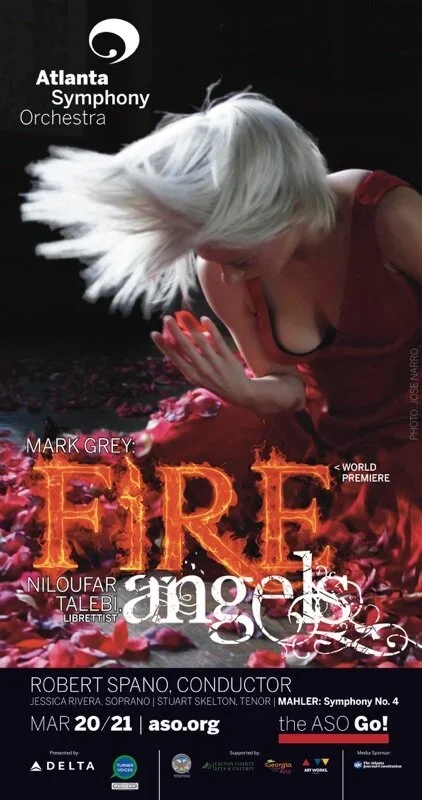Ātash Sorushān (Fire Angels)
Co-commissioned by Carnegie Hall, Cal Performances,
Meet the Composer, Atlanta Symphony Orchestra
By Mark Grey (Composer), Niloufar Talebi (Librettist)
Donato Cabrera (Conductor)
Jessica Rivera (Soprano)
Molly Morkoski and MEME (Ensemble)
World Premiere: March 29, 2011, 7 PM, Carnegie Hall
West Coast Premiere: April 3, 2011, 3 PM, Cal Performances
World premiere of expanded orchestral version:
March 20-21, 2014, 8 PM
Atlanta Symphony Orchestra
Robert Spano (Conductor)
Jessica Rivera (Soprano), Stuart Skelton (Tenor)
“Librettist Niloufar Talebi, the theatrical visionary behind The Persian Rite of Spring, saw the focus of their [9/11] piece Fire Angels as a romance, rather than a John Adams-esque CNN song cycle...rather than retell the events themselves, [they] delve into their emotional cores...”
— Operavore
Carnegie Hall Program Notes
Atlanta Symphony Orchestra Program Notes
Ātash Sorushān (Fire Angels) is a story of love and connection, the tale of Mana and Ahsha, two larger-than-life beings that dwell in separate realms, each convinced of their supreme power. In an all out collision, they seek to prove once and for all who the greater is. Instead, they find Power itself is thrown into question. As their outward and mighty facades crumble, the truth is revealed: in our moments of vulnerability, we are ONE.
Ātash Sorushān (Fire Angels) draws upon various cultural elements, weaving ancient traditions of the East into modern and universal concerns of the present. Mana is the Oceanic and Persian term for the divine life force that embodies everything. Ahsha is an Avestan term for truth/existence. In the Zoroastrian (ancient Iranian religion) tradition, angels watch over things, such as days of the week, Truth, etc. The archangel 'Sorush' is a messenger angel, like Gabriel, who presides over the beginning and end of the world. Sorush fights against daemons that threaten to extinguish the world's fire/passion/truth. Sorushān is the pluralized form of the proper name. Ātash is the Persian word for fire, an element essential to the destruction and renovation of Mana and Ahsha.
The title, Ātash Sorushān (Fire Angels), refers to the role both Mana and Ahsha played out, angels with a message of purification and peace, ending a world and beginning a new one. Mana and Ahsha begin under the assumption of difference, and through the power of transformation, end by realizing their sameness. By humanizing them, each with their own equally magnificent strengths and weaknesses, we explore the grey areas of history in a reflection of our past decade, and summon the question: how can a devastating event become a ground zero for love?

